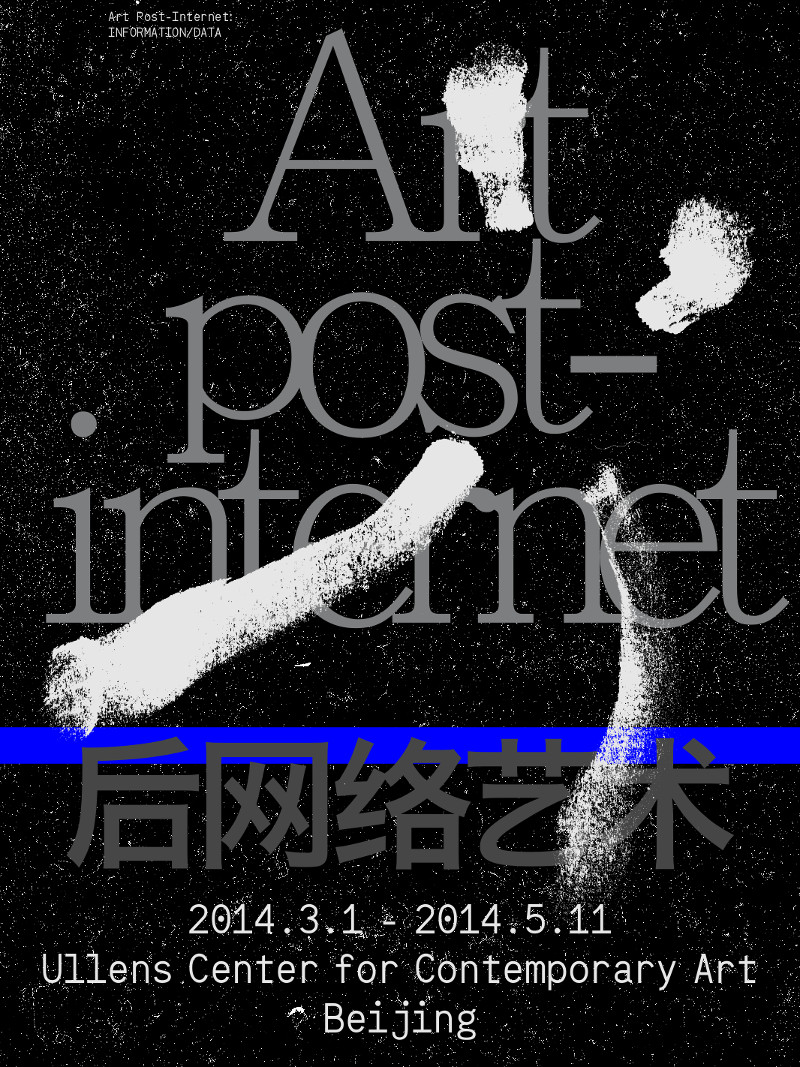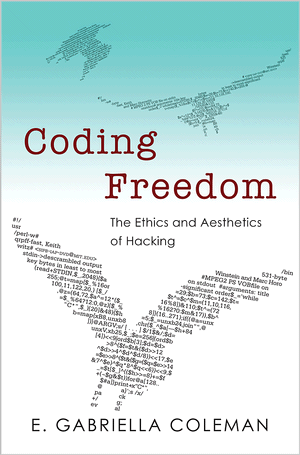Art Post-Internet: Information/Data (2014)
Filed under catalogue | Tags: · aesthetics, art, data, internet, internet art, painting, post internet, sculpture, video, video art, web

A PDF catalogue accompanying the exhibition Art Post-Internet, curated by Karen Archey and Robin Peckham for the Ullens Center for Contemporary Art in Beijing during spring 2014. Includes two essays written by the curators, responses to a questionnaire on the nature of the term “post-internet,” and documentation of the works.
Edited by Karen Archey and Robin Peckham
Designed by PWR Studio, Berlin
Published in October 2014
134 pages
PDF (18 MB, updated on 2021-5-19)
Comment (0)E. Gabriella Coleman: Coding Freedom: The Ethics and Aesthetics of Hacking (2012–) [EN, SC]
Filed under book | Tags: · aesthetics, anonymous, anthropology, code, computing, ethics, floss, free software, hacker culture, hacking, intellectual property, internet, internet activism, software, web

“Who are computer hackers? What is free software? And what does the emergence of a community dedicated to the production of free and open source software–and to hacking as a technical, aesthetic, and moral project–reveal about the values of contemporary liberalism? Exploring the rise and political significance of the free and open source software (F/OSS) movement in the United States and Europe, Coding Freedom details the ethics behind hackers’ devotion to F/OSS, the social codes that guide its production, and the political struggles through which hackers question the scope and direction of copyright and patent law. In telling the story of the F/OSS movement, the book unfolds a broader narrative involving computing, the politics of access, and intellectual property.
E. Gabriella Coleman tracks the ways in which hackers collaborate and examines passionate manifestos, hacker humor, free software project governance, and festive hacker conferences. Looking at the ways that hackers sustain their productive freedom, Coleman shows that these activists, driven by a commitment to their work, reformulate key ideals including free speech, transparency, and meritocracy, and refuse restrictive intellectual protections. Coleman demonstrates how hacking, so often marginalized or misunderstood, sheds light on the continuing relevance of liberalism in online collaboration.”
Publisher Princeton University Press, 2012
Creative Commons Attribution-NonCommercial-NoDerivs 3.0 License
ISBN 1400845297, 9781400845293
264 pages
Responses: Jo Bates, Denisa Kera, Brett Lunceford, Jorge Luis Zapico, Alexander Halavais, Stéphane Leman-Langlois, Ethan Zuckerman
Reviews: James Grimmelmann (Jotwell: Cyberlaw, 2012), David Banks (Cyborgology, 2012), Eric Raymond (2013), Cade Metz (Wired, 2013), Mike Doherty (Hashbang, 2013), Bruce Byfield (Linux Mag blog, 2013), Bryan Behrenshausen (OpenSource.com, 2013), Roy S. Gutterman (Journalism & Mass Communication Q, 2014), Tim Jordan (American J Sociology, 2014), Emily T. A. Earl (Techno_ethno, 2014), Anne Elizabeth Yaniga (Techno_ethno, 2014), Sebastian Kubitschko (Culture Machine, 2014).
Coding Freedom (English, updated on 2013-1-18, PDF, EPUB [updated on 2014-9-2])
Kodiranje slobode. Etika i estetika hakovanja (Serbo-Croatian, trans. Ljubica Gotić and Predrag Todić, 2014)
Vito Campanelli: Web Aesthetics: How Digital Media Affect Culture and Society (2010)
Filed under book | Tags: · aesthetics, computing, digital media, internet, media, media culture, memes, networks, new media, remix, spam, subjectivity, technology, theory, virus, web

“We live in a world of rapidly evolving digital networks, but within the domain of media theory, which studies the influence of these cultural forms, the implications of aesthetical philosophy have been sorely neglected. Vito Campanelli explores network forms through the prism of aesthetics and thus presents an open invitation to transcend the inherent limitations of the current debate about digital culture.
The web is the medium that stands between the new media and society and, more than any other, is stimulating the worldwide dissemination of ideas and behaviour, framing aesthetic forms and moulding contemporary culture and society.
Campanelli observes a few important phenomena of today, such as social networks, peer-to-peer networks and ‘remix culture’, and reduces them to their historical premises, thus laying the foundations for an organic aesthetic theory of digital media.”
Publisher NAi Publishers, Rotterdam; in association with the Institute of Network Cultures at the Hogeschool van Amsterdam, University of Applied Sciences, October 2010
Studies in Network Cultures series
ISBN 9056627708, 9789056627706
276 pages
Reviews: Greg J Smith (Rhizome, 2011), Alessandro Ludovico (Neural, 2011), Regine Debatty (We Make Money Not Art, 2011).
Book website
Interview with the author (Geert Lovink)
Interview with the author (Pasquale Napolitano, Digicult)
PDF, PDF (25 MB, updated on 2019-3-24)
Comments (7)
